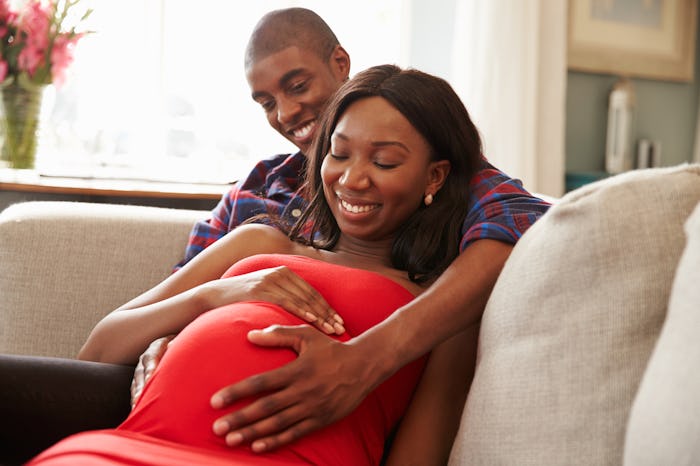After the day you find out that you're pregnant, the most exciting day of your pregnancy is when you feel that first kick. In the beginning, it might just feel like a flutter or champagne bubbles. You might even wonder if it's gas. But as the baby gets bigger, and the kicks get stronger, there's no denying the sensation. By the end of your pregnancy, the little soccer player could make your insides feel like they're gearing up for the World Cup, which can make you wonder: Why is my baby kicking me?
A baby's movement is also knowns as "quickening" and is a normal part of fetal development. There are many reasons that can cause your baby to react, aka kick, including noise, light, and different types of food, according to Belly Belly. You may think of your baby floating in a soundproof, amniotic fluid-filled cocoon, but they can actually respond to what's going on outside of the uterus, and when you can see or feel their movements, you know that your pregnancy is right on track.
When ultrasounds are performed, you can see the fetal movement before you are able to feel it, sometime as early at six to seven weeks gestation, when Baby Centre says the baby starts bending sideways and wiggling. As the weeks progress, the baby starts to move its tiny new arms and legs, eyes, and mouth, and by 15 weeks, even suck its thumb.
However, even with all of this movement going on inside of you, you may not feel any of it until a few weeks into the second trimester. American Pregnancy says you are most likely to feel these first kicks sometime between 18 and 25 weeks. If it's not your first pregnancy, you may be more familiar with what the movement feels like and recognize early on that the subtle sensations you're feeling in your growing belly are in fact your baby, not just gas.
As your pregnancy progresses you should be able to feel the baby moving more often, though there will be plenty of times they are resting, even for relatively long stretches of time. Often, the more you are moving around, the less they are, as that action can lull them to sleep. Most of the time you'll be too busy to keep track of your baby's movements, or won't be able to feel them since you're moving. But when you lie down at the end of the day, not only are you still enough to feel your baby moving, but it's when they are most active. This is a blessing if you're just chilling on the couch, and not so endearing when you're trying to sleep.
Just before your third trimester is when moms typically start counting their baby's kicks, midwife Chana Meir tells Romper. The March of Dimes recommends doing this every day around the same time, when you notice activity is the greatest. While lying on your side, count the number of movements. You should be able to get to 10 in an hour. If you don't, try again later that day. It might be helpful to eat or drink something sweet, like a cookie or orange juice, as the sugar often gets them moving.
If you feel a marked reduction in your baby's activity, it's important to call your doctor. Dr. Shantala Vedelyar, an obstetrician and fetal and maternal medicine specialist advised on The Health Site, "Reduced fetal movements can raise a concern because it might mean that the fetus is not getting sufficient nutrition or oxygen. A detailed maternal and fetal assessment by ultrasound scan and a non-stress test, which checks the fetal heart rate patterns should be undertaken to evaluate the cause of reduced fetal movements."
As your due date gets closer, you can even see the outline of the baby's foot pressing through your belly. It's like having a swamp creature inside of you. But the kicks and the movement are very reassuring and can be a lot of fun. Well, that is until they start kicking you in the ribs or, even worse, your very full bladder.
Check out Romper's new video series, Romper's Doula Diaries:
Watch full episodes of Romper's Doula Diaries on Facebook Watch.
